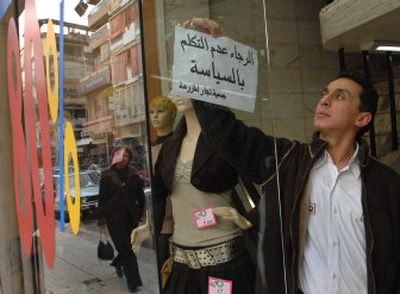Some Lebanese try to ban talk of politics, religion

BEIRUT, Lebanon – Beirut store owners are trying a new way to lower the sectarian tensions that have erupted into street violence: putting up signs banning political talk in their shops.
It’s one of the ways Lebanese are coping with the standoff between pro- and anti-government camps.
“It’s better without politics,” reads the red and white sticker at the entrance of a pub on the restaurant- and bar-filled Gemayzeh Street in the Christian sector of Beirut.
At a posh gym across town, a sign reminds clients: “This is a place for sports so please refrain from expressing political opinions.” And on the dashboard of a taxi cab, yellow sticky notes try to ban talk of politics.
The signs, which began as scattered individual initiatives, have caught on, particularly after a political spat in the cafeteria of the Beirut Arab University on Jan. 25 turned into street riots that killed four people, the worst outbreak of sectarian violence since the 1975-90 civil war.
“I have customers from all religions and sects; I can’t afford to have them fight with each other,” said Oussama Mansour, a 31-year-old grocer in a Muslim neighborhood who put up a sign asking customers to “Please refrain from discussing politics and religion.”
He said he has had the sign in his shop since former Prime Minister Rafik Hariri’s assassination two years ago but recently added the word “religion” to it.
“You start talking with someone and they immediately want to know who and what are you: pro- or anti-government, Christian or Muslim, Sunni or Shiite. It’s become disgusting,” Mansour said.
Politics is a national pastime for Lebanese, and the country has long been a battleground where regional and international conflicts are played out. The topic inevitably arises when people meet, making for animated discussions.
But it has become explosive since the Hezbollah-led opposition launched its campaign of protests and sit-ins in Beirut on Dec. 1 seeking to topple the U.S.-backed government. Prime Minister Fuad Saniora has stood firm against Iranian-backed Hezbollah’s demand for effective veto power in the Cabinet for it and its allies.
In Beirut’s religiously mixed Mazraa commercial district, almost every shop now has a sign banning talk of politics.
“It’s not just for the customers; it’s a reminder for us, too,” said Ahmed Baasiri, a jewelry shop owner. He said businesses in the area made a collective decision last week to post the signs and take down political slogans and pictures of politicians.
Zuheir Shukur, president of the state-run Lebanese University, on Monday urged students to keep politics off campus.
“You can talk politics – in a decent way. More than this is forbidden,” he told prospective students during a campus tour.
Charles Harb, a social psychology professor at the American University of Beirut, sees the ban on politics as a good way to try to avoid emotional reactions. But he also considers it a form of “avoidance” that does not necessarily help resolve conflict.
“But we have a very serious polarization in our society and, as in all kinds of society, you have people that do not want to be lumped in one group or another, and these will want to create some sort of space for themselves,” he said.